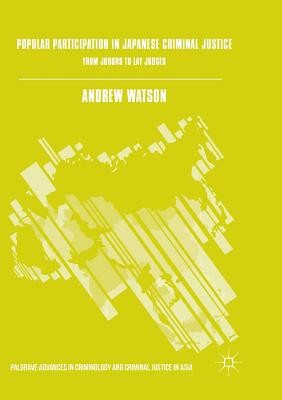
- We will send in 10–14 business days.
- Author: Andrew Watson
- Publisher: Palgrave Macmillan
- Year: 2018
- Pages: 192
- ISBN-10: 3319817175
- ISBN-13: 9783319817170
- Format: 14.8 x 21 x 1 cm, minkšti viršeliai
- Language: English
- SAVE -10% with code: EXTRA
Reviews
Description
This book analyses the mixed courts of professional and lay judges in the Japanese criminal justice system. It takes a particular focus on the highly public start of the mixed court, the saiban-in system, and the jury system between 1928-1943. This was the first time Japanese citizens participated as decision makers in criminal law. The book assesses reasons for the jury system's failure, and its suspension in 1943, as well as the renewed interest in popular involvement in criminal justice at the end of the twentieth century.
Popular Participation in Japanese Criminal Justice proceeds by explaining the process by which lay participation in criminal trials left the periphery to become an important national matter at the turn of the century. It shows that rather than an Anglo-American jury model, outline recommendations made by the Japanese Judicial Reform Council were for a mixed court of judges and laypersons to try serious cases. Concerns about the lay judge/saiban-in system are raised, as well as explanations for why it is flourishing in contemporary society despite the failure of the jury system during the period 1928-1943. The book presents the wider significance of Japanese mixed courts in Asia and beyond, and in doing so will be of great interests to scholars of socio-legal studies, criminology and criminal justice.
EXTRA 10 % discount with code: EXTRA
The promotion ends in 23d.00:51:38
The discount code is valid when purchasing from 10 €. Discounts do not stack.
- Author: Andrew Watson
- Publisher: Palgrave Macmillan
- Year: 2018
- Pages: 192
- ISBN-10: 3319817175
- ISBN-13: 9783319817170
- Format: 14.8 x 21 x 1 cm, minkšti viršeliai
- Language: English English
This book analyses the mixed courts of professional and lay judges in the Japanese criminal justice system. It takes a particular focus on the highly public start of the mixed court, the saiban-in system, and the jury system between 1928-1943. This was the first time Japanese citizens participated as decision makers in criminal law. The book assesses reasons for the jury system's failure, and its suspension in 1943, as well as the renewed interest in popular involvement in criminal justice at the end of the twentieth century.
Popular Participation in Japanese Criminal Justice proceeds by explaining the process by which lay participation in criminal trials left the periphery to become an important national matter at the turn of the century. It shows that rather than an Anglo-American jury model, outline recommendations made by the Japanese Judicial Reform Council were for a mixed court of judges and laypersons to try serious cases. Concerns about the lay judge/saiban-in system are raised, as well as explanations for why it is flourishing in contemporary society despite the failure of the jury system during the period 1928-1943. The book presents the wider significance of Japanese mixed courts in Asia and beyond, and in doing so will be of great interests to scholars of socio-legal studies, criminology and criminal justice.


Reviews